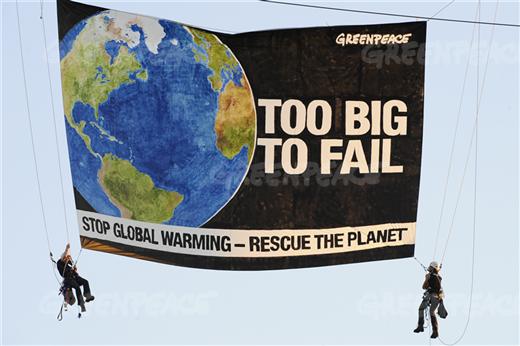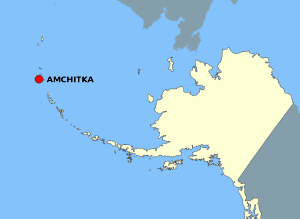|
Kleercut
Kleercut is the name of a former campaign conducted by Greenpeace, the Natural Resources Defense Council, and others towards Kimberly-Clark. It lasted from 2004 to 2009. Kimberly-Clark is the world’s largest manufacturer of tissue products, most notably the Kleenex brand. According to its annual environmental report, the company purchases over 3.1 million metric tonnes (3.4 million tons) of virgin fiber from logging companies annually. The Kleercut campaign claims that this fiber is derived from wood pulp from old growth forests. Kimberly-Clark claims that the forests in question are largely cut for timber. The Kleercut campaign claims that Kimberly-Clark support the clearcutting of such forests in Canada and the United States, including forests habitat for wolverine and threatened wildlife the woodland caribou. Kimberly-Clark has responded that many of its supplies are certified by the Sustainable Forestry Initiative or the Canadian Standards Association. Detailed campaign goa ... [...More Info...] [...Related Items...] OR: [Wikipedia] [Google] [Baidu] |
Phil Radford
Philip David Radford (born January 2, 1976) is an American activist who served as the executive director of Greenpeace USA. He is the founder and President of Progressive Power Lab, an organization that incubates companies and non-profits that build capacity for progressive organizations, including a donor advisory organization Champion.us, the Progressive Multiplier Fund and Membership Drive. Radford is a co-founder of the Democracy Initiative, was founder and executive director of Power Shift, and is a board member of the Mertz Gilmore Foundation. He has a background in grassroots organizing, corporate social responsibility, climate change, and clean energy. Early life and education Radford began his environmental activism as a high school student at Oak Park and River Forest High School in Oak Park, a Chicago suburb, volunteering for an environmental justice campaign to stop the building of trash incinerators in the West Side of Chicago near his family's Oak Park home. His f ... [...More Info...] [...Related Items...] OR: [Wikipedia] [Google] [Baidu] |
Greenpeace
Greenpeace is an independent global campaigning network, founded in Canada in 1971 by Irving Stowe and Dorothy Stowe, immigrant environmental activists from the United States. Greenpeace states its goal is to "ensure the ability of the Earth to nurture life in all its diversity" and focuses its campaigning on worldwide issues such as climate change, deforestation, overfishing, commercial whaling, genetic engineering, and anti-nuclear issues. It uses direct action, lobbying, research, and ecotage to achieve its goals. The network comprises 26 independent national/regional organisations in over 55 countries across Europe, the Americas, Africa, Asia and the Pacific, as well as a co-ordinating body, Greenpeace International, based in Amsterdam, the Netherlands. The global network does not accept funding from governments, corporations, or political parties, relying on three million individual supporters and foundation grants. [...More Info...] [...Related Items...] OR: [Wikipedia] [Google] [Baidu] |
Wood Fiber
Wood fibres (also spelled wood fibers, see spelling differences) are usually cellulosic elements that are extracted from trees and used to make materials including paper. The end paper product (paper, paperboard, tissue, cardboard, etc.) dictates the species, or species blend, that is best suited to provide the desirable sheet characteristics, and also dictates the required fibre processing (chemical treatment, heat treatment, mechanical "brushing" or refining, etc.). In North America, virgin (non-recycled) wood fibre is primarily extracted from hardwood (deciduous) trees and softwood (coniferous) trees. The wood fibre can be extracted as a primary product, or collected during the milling of lumber. Wood fibres can also be recycled from used paper materials. Paper Wood fibres are treated by combining them with other additives which break down the fibres into a spongy mass called pulp. The pulp is then processed, and the network of tiny fibres is pressed flat, becoming paper. C ... [...More Info...] [...Related Items...] OR: [Wikipedia] [Google] [Baidu] |
Overlogging
Overlogging is a form of overexploitation caused by legal or illegal logging activities that lead to unsustainable or irrecoverable deforestation and permanent habitat destruction for forest wildlife. Causes The use of poor logging practices and heavy machinery leads to overlogged forests. Norman Myers argued that forms of environmental degradation like overlogging are a consequence of " perverse subsidies." The production of disposable tissues significantly contributes to the effects of overlogging. In rural China, overlogging is related to the need for firewood as fuel. Overlogging is often associated with attempts at reducing the "Third world debt," although it is not restricted to developing countries. Effects With the developed world's growing demand for pulp and paper, overlogging is an imminent threat to Earth's forests. In central Japan, forests located closer to power plants were found to be more vulnerable to overlogging. Overlogging has caused significant dama ... [...More Info...] [...Related Items...] OR: [Wikipedia] [Google] [Baidu] |
Certified Wood
Certified wood and paper products come from responsibly managed forests – as defined by a particular standard. With third-party forest certification, an independent organization develops standards of good forest management, and independent auditors issue certificates to forest operations that comply with those standards. Requirements Forest certification programs typically require that forest management practices conform to existing laws. Other basic requirements or characteristics of forest certification programs include: Basic requirements of credible forest certification programs include: * Protection of biodiversity, species at risk and wildlife habitat; sustainable harvest levels; protection of water quality; and prompt regeneration (e.g., replanting and reforestation). * Third-party certification audits performed by accredited certification bodies. * Publicly available certification audit summaries. * Multi-stakeholder involvement in a standards development process. * Co ... [...More Info...] [...Related Items...] OR: [Wikipedia] [Google] [Baidu] |
The Washington Post
''The Washington Post'' (also known as the ''Post'' and, informally, ''WaPo'') is an American daily newspaper published in Washington, D.C. It is the most widely circulated newspaper within the Washington metropolitan area and has a large national audience. Daily broadsheet editions are printed for D.C., Maryland, and Virginia. The ''Post'' was founded in 1877. In its early years, it went through several owners and struggled both financially and editorially. Financier Eugene Meyer purchased it out of bankruptcy in 1933 and revived its health and reputation, work continued by his successors Katharine and Phil Graham (Meyer's daughter and son-in-law), who bought out several rival publications. The ''Post'' 1971 printing of the Pentagon Papers helped spur opposition to the Vietnam War. Subsequently, in the best-known episode in the newspaper's history, reporters Bob Woodward and Carl Bernstein led the American press's investigation into what became known as the Watergate scandal ... [...More Info...] [...Related Items...] OR: [Wikipedia] [Google] [Baidu] |
Fast Company (magazine)
''Fast Company'' is a monthly American business magazine published in print and online that focuses on technology, business, and design. It publishes six print issues per year. History ''Fast Company'' was launched in November 1995 by Alan Webber and Bill Taylor, two former ''Harvard Business Review'' editors, and publisher Mortimer Zuckerman. The publication's early competitors included '' Red Herring'', ''Business 2.0'' and ''The Industry Standard''. In 1997, ''Fast Company'' created an online social network, the "Company of Friends" which spawned a number of groups that began meeting. At one point the Company of Friends had over 40,000 members in 120 cities, although by 2003 that number had declined to 8,000. In 2000, Zuckerman sold ''Fast Company'' to Gruner + Jahr, majority owned by media giant Bertelsmann, for $550 million. Just as the sale was completed, the dot-com bubble burst, leading to significant losses and a decline in circulation. Webber and Taylor left the mag ... [...More Info...] [...Related Items...] OR: [Wikipedia] [Google] [Baidu] |
New York Times
''The New York Times'' (''the Times'', ''NYT'', or the Gray Lady) is a daily newspaper based in New York City with a worldwide readership reported in 2020 to comprise a declining 840,000 paid print subscribers, and a growing 6 million paid digital media, digital subscribers. It also is a producer of popular podcasts such as ''The Daily (podcast), The Daily''. Founded in 1851 by Henry Jarvis Raymond and George Jones (publisher), George Jones, it was initially published by Raymond, Jones & Company. The ''Times'' has won List of Pulitzer Prizes awarded to The New York Times, 132 Pulitzer Prizes, the most of any newspaper, and has long been regarded as a national "newspaper of record". For print it is ranked List of newspapers by circulation, 18th in the world by circulation and List of newspapers in the United States, 3rd in the U.S. The paper is owned by the New York Times Company, which is Public company, publicly traded. It has been governed by the Sulzberger family since 189 ... [...More Info...] [...Related Items...] OR: [Wikipedia] [Google] [Baidu] |
Forest Stewardship Council
The Forest Stewardship Council A. C. (FSC) is an international non-profit, multistakeholder organization established in 1993 that promotes responsible management of the world's forests via timber certification. It is an example of a market-based certification program used as a transnational environmental policy. Purpose The FSC's stated mission is to "promote environmentally appropriate, socially beneficial, and economically viable management of the world's forests". To this end, the body has published a global strategy with five goals: # Advancing globally responsible forest management. # Ensure equitable access to the benefits of FSC systems. # Ensure integrity, credibility and transparency of the FSC system. # Create business value for products from FSC certified forests. # Strengthen the global network to deliver on goals 1 through 4. These goals are promoted, managed, and developed through six program areas: forests, chain of custody, social policy, monitoring and e ... [...More Info...] [...Related Items...] OR: [Wikipedia] [Google] [Baidu] |
Post-consumer Recycled Fiber
Recycling is the process of converting waste materials into new materials and objects. The Energy recycling, recovery of energy from waste materials is often included in this concept. The recyclability of a material depends on its ability to reacquire the properties it had in its original state. It is an alternative to "conventional" waste disposal that can save material and help lower greenhouse gas emissions. It can also prevent the waste of potentially useful materials and reduce the consumption of fresh raw materials, reducing energy use, air pollution (from incineration) and water pollution (from landfilling). Recycling is a key component of modern waste reduction and is the third component of the "Waste minimisation, Reduce, Reuse, and Recycle" waste hierarchy. It promotes environmental sustainability by removing raw material input and redirecting waste output in the economic system. There are some International Organization for Standardization, ISO standards related t ... [...More Info...] [...Related Items...] OR: [Wikipedia] [Google] [Baidu] |


.jpg)


.png)